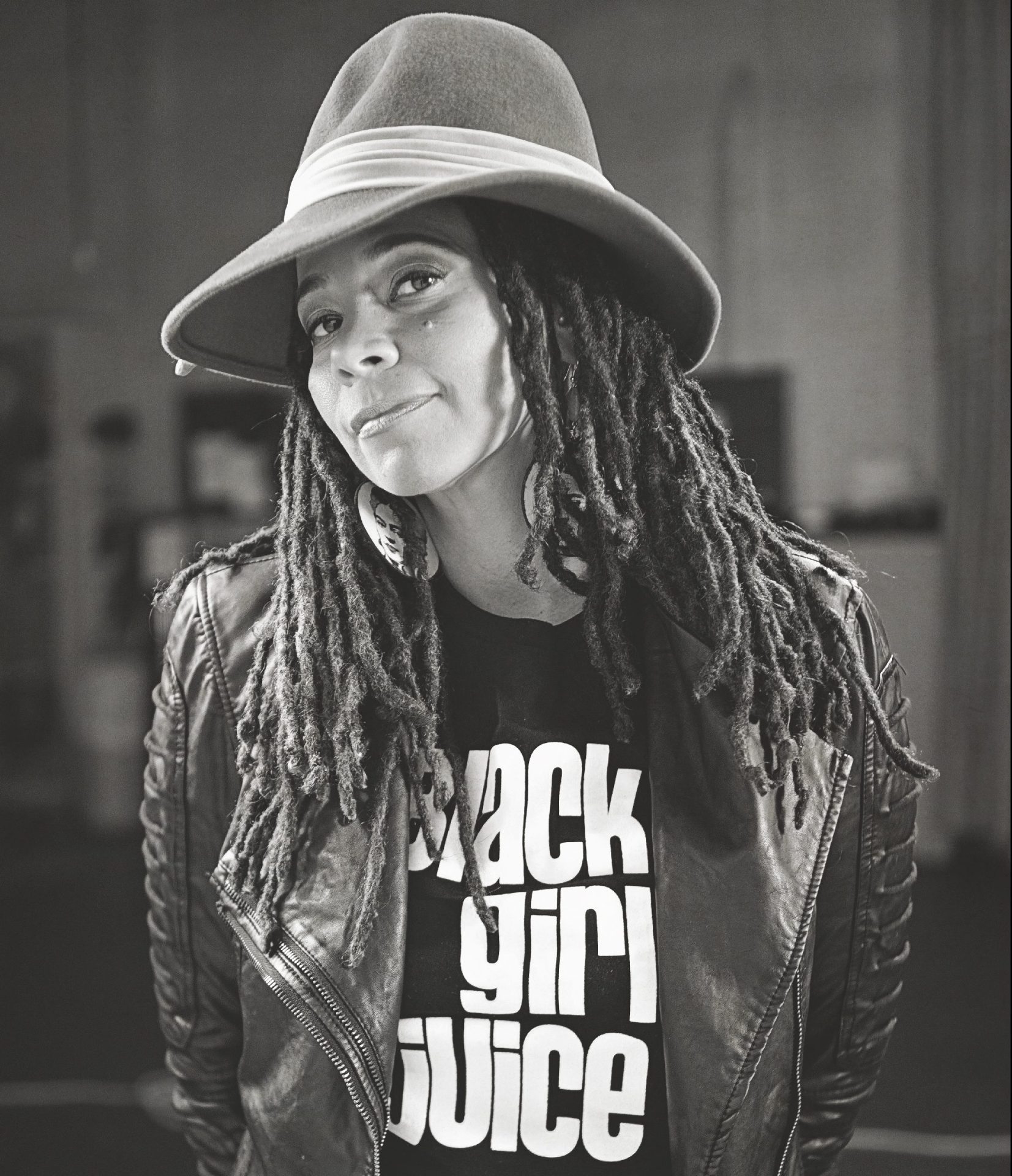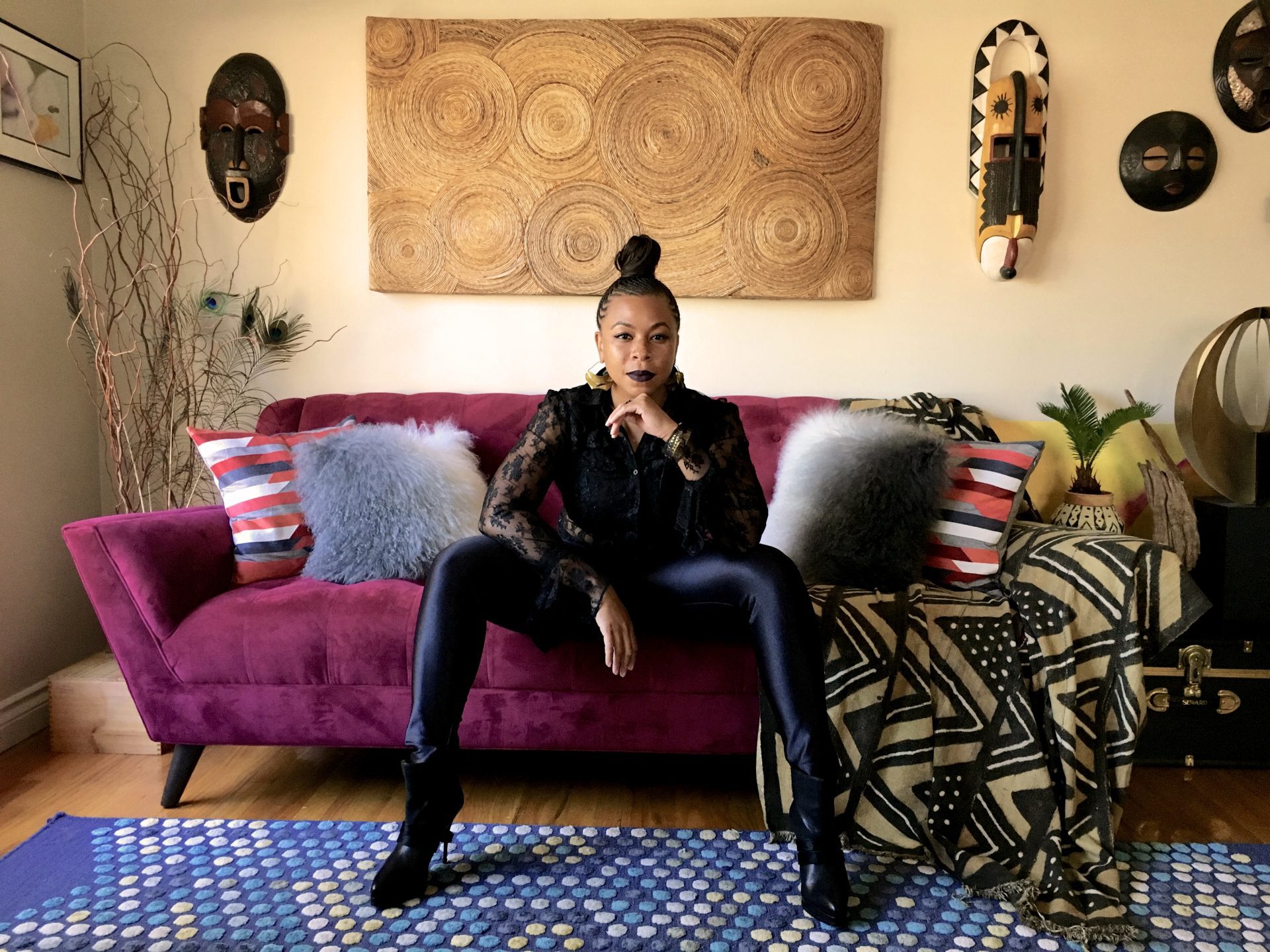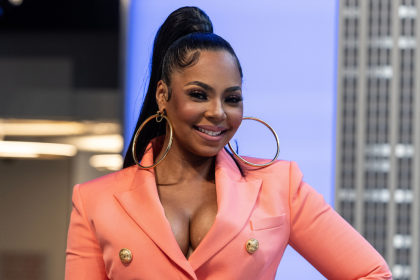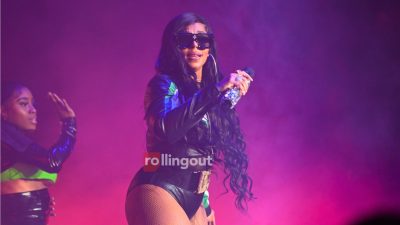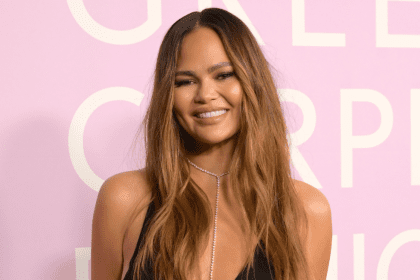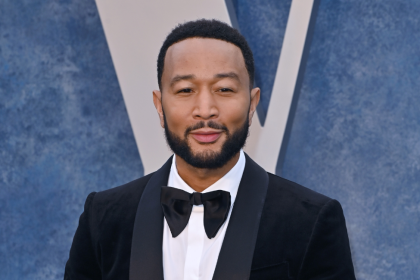
What led you to organize a movement in Ferguson?
I was already in New York City for a performance, and speaking to my friend of 20 years, emcee Talib Kweli, he told us he was headed to Ferguson. So many of us were speaking about it among ourselves for many days. Those of us in the arts and activist community were tired of looking at it on the news. He told me to meet him there along with activist Rosa Clemente. I don’t consider myself the organizer of a movement, just one of the artists dedicating my time and heart to the cause.
How did you get the word out and develop a team to start the journey to Ferguson?
We went quietly at first, talking just among ourselves. Then we started using Twitter and other social media platforms where we all have large followings. We went public once we touched down.
Why is it important for artists and musicians of today to be involved with protest movements?
I’ve learned from my teachers, Gil Scott Heron, Amiri Baraka, Sonia Sanchez, The Last Poets – Marvin Gaye was our battle crier – you know? Artists and musicians have access to audiences. We can move crowds, inspire people to do something great. How can we not be a part of movement for social change? For human rights. I feel it is my responsibility to speak for those who can’t speak for themselves or who are never asked to speak, especially in the mainstream media. I’m a black woman, so keeping us silent is pretty much daily practice. So, we have access to a mic and the people, and we have to take advantage of that in a good way.
Who among your peers supported your right to protest peacefully in Ferguson?
Thousands of people reached out and showed solidarity with us. Dream Defenders, Killer Mike, Murphy Lee, Radcliffe Bailey, thousands of our FB and Twitter fans and followers supported us through encouraging words and text messages, so we never felt alone.
What does the absence of major celebrities say about the consciousness of the black celebrities?
Well, my expectation for “major” celebrities is not high, but I wish I saw more artists speaking out. I love that John Legend spoke out and wore the “Don’t Shoot” shirt at a concert. Nelly was out there. The reality is before me or artists like Talib Kweli became famous in our world, we were already about something. This is not something you gain after you make millions of dollars. We were already people with integrity and writers and artists with love for our global community, so we are being who we have always been. We have power when we are working together. I saw that in Ferguson. I wish more would speak out, but i’m not waiting for it.
What role has apathy played in the black community that allowed Ferguson and racism to grow in the U.S.?
I used to speak about the apathetic college student or apathy among my people. But I understand that folks have been getting beat down for so long. I guess some of us get tired and cave in. It’s not that racism has grown in the USA; racism never left. Racism was institutionalized, so you couldn’t see it up close. The inability for me to give my son a great education in a public school right now is racism at work. Some of the middle class black community left and never looked back. Their children attend suburban schools with white students, and they don’t give back to the neighborhood that shaped them, gave them some character and pride. If they were apathetic before Ferguson, well, this is a wake-up call.
How has economic racism played a role in the Ferguson situation?
The class issue always goes hand and hand with race. You can’t really separate the two. We know that there is an attack on the poor, and the children of the poor. The way a police force polices an upper or middle class neighborhood, black or white, is going to be different than how the projects or a poorer block is respected. There’s no respect for the working class anymore. I grew up in a blue collar city – a union city. They shut off the people’s water in Detroit.
Why is economic racism and results of it not being discussed regarding Ferguson?
So many things are not being discussed regarding Ferguson, because so many white Americans are in deep denial about their own racism. They are criminalizing our boys and girls, especially the ones they feel have no economic power. The whole notion of the looters being called “thugs.” Looting is a response to feeling as if you don’t own anything around you. It’s a response to oppression and definitely lack of jobs. The word thug is constantly being used over and over again to define our boys. The thugs were in uniform in full force in Ferguson this week and it’s always been that way.

What celebrities are exhibiting proper support for Ferguson and how?
Talib Kweli. I’m so proud of him. We are in the middle of putting out my album project, and here we are on the front line of something so much greater than us. And also, there’s J Cole and Nelly.
Kevin Powell is doing a town hall with youth Monday at the Missouri History Museum; Killer Mike has been great. There could be more I’m sure.
What art will and have you produced from this experience?
I’m still traumatized, so at some point the writing will come. For now it’s been about the testimony. Telling the story about what happened to all of us. One of my favorite people, actor Roger Guenvere Smith, said to me today, “Sometimes the poem isn’t even a poem.” The art will come. Today, I’m just using my voice to support the youth movement that must come out of this. To help build pressure for what the long term work that is necessary, which must start with hiring a police force that actually lives in the community it is paid to serve and protect.
What was your experience with the law enforcement in Ferguson?
When we first arrived to the main strip, the air was very thick. You could feel the tension in the air. The looks on the cops’ faces were so detached and stoic. The people were peaceful, but not allowed to congregate for more than a few moments. We were asked to keep it moving and to stay on the sidewalk most of the time. There so so many teenagers out there, and it was great to speak with them about their neighborhood. They are hurting. The first few hours were OK, but when midnight hit, the police, in full military gear began to line up in a formation in the street. There was no agitation from protestors. We — Talib Kweli, Rosa Clemente and member of The Peace Poets from the Bronx and I — were walking toward the area where our car was parked. Rosa said they were about to move on us. We were completely caught off guard. We all saw a plastic water bottle tossed, literally tossed gently, rainbow arched, toward the cops. That was it — they charged us. Everyone started to run, it was complete chaos and terrifying. I could hear police screaming “I got one, I got one,” when they pulled a peaceful protestor off the street. Then we were forced to lie on the concrete with rifles pointed at eye level. A few officers were kneeling down toward us. It was madness and confusing and it was the first time I thought I might be killed in a protest or see someone shot right in front of me. There was a girl who was scared in front of me who had lost her friends and I kept pulling her back down to the ground. One of the young boys we were speaking with was being held by Rosa. The police had the gun pointed to his chest. It was dehumanizing. A black cop with more rank came near us and told them to stand down and they let us walk away. No one spoke for a few minutes. This was 1967 for us. To hear dogs barking and helicopters so low. Ferguson was/is under siege. The police are given all this military gear, with no military training. You could tell they hadn’t carried weapons like this before. The tanks were unnerving. This is 2014. This is a community in mourning. A child was murdered in the middle of the day and left to bleed to death in front of his friends and family for hours. This is terrorism. My interaction with the National Guard was very different than the local police. A few said, “Hello.” They knew how to communicate with human beings as human beings on some level.
How has the mainstream media accurately covered Ferguson, if at all?
I think the alternative media has done a much better job. HuffPost, WBAI, Al Jazeera, satellite radio stations, they are out here looking for balanced stories. The mainstream media is doing what we expect, supporting the mainstream. I’ve seen some decent side-bar stories, but the way they presented that video of Mike Brown in that store, the words that are used to describe this young man just make my stomach hurt. The media has moments, when you get a reporter that actually wants some balanced perspective, but we saw firsthand how they did not report accurately what happened to the people the night we were out there. It was so surreal, and I’m thankful I wasn’t alone so we could tell our collective, united stories together.
Describe three emotions that you dealt with while you were in Ferguson?
Sadness for us as a nation. Anger. Fear.

What else should we be doing after Ferguson three months from now, a year from now?
What we must do in Ferguson is not forget about them. To remain in solidarity with the people on the ground there, and let the city know that they have a nation of people behind them. Ferguson is Chicago, is New York City, is LA, is Detroit. This can and will happen again if we don’t continue to let our elected officials know what our needs our in our own backyard. There will be push for voting, and that’s one fight. There are organizations out there that already focus on getting folks engaged in the voting process locally. Within three months, we need to see more organizing among the youth there. I know these young people. They have so much heart and so much in them, they need an opportunity to be strengthen, and radicalize their voices. They have to heal from the trauma of watching their friend being murdered this way. Platforms for them to speak will be necessary. They are the answer. People put little faith in our young people, but if you empower them with resources, they can change the dynamic of power and become leaders on their own block and perhaps in our nation down the road. The Organization of Black Struggle is a strong voice in St. Louis, and I’m proud of their incredible efforts and the work of The Dream Defenders.
Are protests enough given the state of our communities?
Protests are a part of the solution. The people must wake up, must organize in their own cities across the nation. The problems of race and racism and classism are so complex, layered. We must have community policing if we indeed have a community. We clearly cannot trust or allow local police officers to take care of a community or better yet, a neighborhood unless they care about the people who live there. We need our education system to be completely overhauled. The over crowded classrooms and watered down curriculums are abusive and leave our children behind and leads to illiteracy. I’m not just talking about black children, white children in affluent schools are culturally illiterate, and this cultural illiteracy is the way racism continues to come back to haunt us. In 2014 with a black president, we should be so much farther ahead with race relations in this country, but we are not. So, education reform and jobs are a part of the long term necessary agenda.
What needs to change in the black community’s method of addressing economic racism?
Self-reliance. We must find ways to keep money in our own community with people who support our growth and livelihood. We can’t just clap our hands when we like an artists work, we have to buy their music and books. We need our own institutions. I learned from institution builders like Haki Madhubuti of Third World Press. We must educate our own children if the U.S. education system refuses to do it with love. We have to learn to grow our own food and not spend so much time in the big grocery stores. At least support a local farmers market. Small things can really make a large difference.
What should the hip-hop generation take away from the Ferguson experience and their belief in the existence of racism?
I think the hip-hop generation is fully aware of the existence of racism, but we have to use our power, our global power to make sure the people who listen to us sing, rhyme, poet, whatever it is . . . have some accountability with social justice issues. It’s not enough to just be an artist. Demand more from these artists or don’t support their work. One of the defining moments of my life as a young poet was meeting Kwame Toure in Long Island. He was having a private Q&A with students and I stood up and asked him what my role was to the movement as a poet. He asked me “Are you a real poet or a bull—- poet?” I answered back, “I’m a real poet.” He asked me to do a poem. So I recited “Black Statue of Liberty,” and he told me I was doing what I was supposed to be doing. Art can heal, can help incite great minds to take action and can liberate. We need art and we need artists.
Has social media helped or hurt the movement?
Social media is a double-edged sword. What’s wonderful is that we were able to get a different perspective out there. So many people, several hundred told me thank you and said the story from the field that Kweli and Rosa and I were giving was so different from what they were getting from mainstream media. So, it worked in our favor. Social media also lends itself to people who are very racist, divisive and sometimes threatening. I had to go over to some of my white friends pages to see what they were saying about Ferguson. It was pretty horrible, some of the opinions were so overtly racist and they seemed as if they didn’t have a clue. The way they would refer to the looters or even Mike Brown as a thug or “shoplifter.” It’s frustrating, but I did engage in dialogue with some of them. Social media is a place for conversation, but it’s also a way to hide. We need open discussions, no filter. This is youth movement. It’s not about us. It’s about empowering this next generation . . . so my son’s life can be better.


